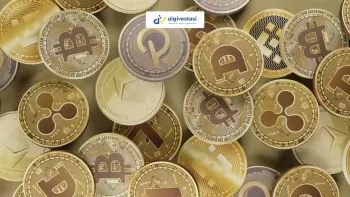
Crypto News
Deutsche Bank Set to Become Banking Partner for Bullish - The Crypto Exchange Listed on NYSE!
/index.php
Investasi Digital - Posted on 05 August 2025 Reading time 5 minutes

Foreign capital has been exiting Indonesia’s financial markets from the end of July through early August 2025. According to data from Bank Indonesia (BI), during the trading period of July 28–31, foreign investors recorded net selling across all instruments.
Specifically, there was a net sell of Rp2.27 trillion in the stock market, Rp1.37 trillion in government bonds (SBN), and Rp12.60 trillion in Bank Indonesia Rupiah Securities (SRBI).
Throughout July, capital outflows continued with a total value reaching Rp45.93 trillion. The Indonesian stock market also experienced foreign capital flight, with net selling amounting to Rp1.74 trillion in just the first two days of August (August 1–2). On July 31 alone, foreign net selling hit Rp1.2 trillion.
David Sumual, Chief Economist at BCA, explained that recent market turbulence has been triggered by multiple factors, one of which is a shift in expectations regarding U.S. monetary policy.
Higher-than-expected inflation figures and a hawkish stance at the latest Federal Open Market Committee (FOMC) meeting have significantly reduced the likelihood of a rate cut by the Federal Reserve.
“However, the revised U.S. labor data released last Friday helped counter that sentiment, and actually increased the odds of a rate cut by the Fed in September,” David told CNBC Indonesia on Tuesday (August 5, 2025).
On the other hand, domestic economic conditions have also weighed on investor sentiment. David noted that the market’s outlook for Indonesia’s Q2 GDP data—set to be released today by the Central Statistics Agency (BPS)—is relatively pessimistic.
“Especially with the second-quarter GDP outlook being not too positive and the additional risk from export tariffs. Still, the dominant factor this past month has been the changing expectations around U.S. monetary policy,” he added.
Josua Pardede, Chief Economist at Bank Permata, also observed that global investors are shifting toward safer assets such as U.S. Treasuries, driven by signs of a strengthening U.S. economy, including second-quarter GDP growth of 3.00%.
Solid labor market data that surpassed consensus estimates has further reinforced expectations that rate cuts by the Fed will be more limited.
“This has led investors to expect that any Fed rate cuts will be more constrained than previously anticipated,” Josua told CNBC Indonesia on Tuesday (August 5, 2025).
On the domestic front, Josua added that expectations for Bank Indonesia to adjust interest rates are narrowing, due to the decreasing interest rate differential between Indonesia and the U.S.
“Even though Indonesia’s economic fundamentals remain fairly strong—with inflation relatively under control, rising to 2.37% year-on-year in July 2025, and a trade surplus maintained for 62 consecutive months—risk perception has nonetheless increased,” he explained.
David highlighted that the continued foreign capital outflow from Indonesia's financial markets needs to be viewed in light of various external influences.
Over the past two days, the rising probability of Fed rate cuts has actually led to a normalization or drop in yields.
“Still, we will only see the real impact of the tariff policy after the August 7 deadline, and this will likely affect the months ahead,” said David.
Should this policy disrupt Indonesia’s trade surplus, the room for domestic bond yields (SBN) to follow the declining U.S. Treasury yields will likely be constrained.
Meanwhile, Josua pointed out that the latest projections suggest potential for the rupiah to stabilize or even strengthen in the next three months, driven by expectations of a more aggressive Fed rate cut—up to 75 basis points in 2025.
Additionally, the U.S. softening its tariff stance toward Indonesia—from 32% down to 19%—could ease some of the pressure on the rupiah.
According to Josua, the foreign outflows could pressure Indonesia’s domestic market, particularly in bonds and the exchange rate.
This pressure has already begun to show, with Indonesia’s government bond yields slowly rising and the government bond index slipping by 0.11% at the end of July.
“Nevertheless, the domestic bond market remains fairly resilient, supported by local investors—especially banks—which purchased over Rp50 trillion worth of SBN during the final week of July,” Josua concluded.
Source: cnbcindonesia.com
What do you think about this topic? Tell us what you think. Don't forget to follow Digivestasi's Instagram, TikTok, Youtube accounts to keep you updated with the latest information about economics, finance, digital technology and digital asset investment.
DISCLAIMER
All information contained on our website is summarized from reliable sources and published in good faith and for the purpose of providing general information only. Any action taken by readers on information from this site is their own responsibility.